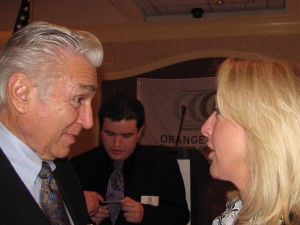
Why can”™t we all just get along? Partisan politics continue to separate Congress as it works on both the 2011 budget and the 2012 budget, U.S. Rep. Maurice Hinchey told Orange County Chamber of Commerce members last week at a luncheon.
The Democratic congressman said federal and state support for local infrastructure are critical to the growth of the region and to Stewart International Airport, pointing to the completed connection between Interstates 87 and 84 and turning Route 17 into Interstate 86, which will connect with the Thruway at Exit 16 in Harriman.
“Passenger air service and cargo are imperative to help Stewart Airport to grow … as well as a need to improve the air-traffic control system with ”˜next gen”™ technology, which is moving forward in a very positive way,” Hinchey said.
Work at Exit 122 to improve the traffic flow is under way, welcome news to Crystal Run Road”™s “Medical Mile” in the town of Wallkill, where the new Orange Regional Medical Center (ORMC) is set to open by summer.
Hinchey proposed the establishment of a new medical college at Horton Hospital in Middletown once it is vacated by ORMC when it moves into the new hospital.
The best news Hinchey delivered was the restoration of the $100 million loan guarantee for the Taylor Biomass project in Montgomery, which was nearly cut in the current federal budget debate. The project will create at least 300 construction jobs and 90 permanent jobs.
The construction site for the biomass facility is moving ahead, said Jim Taylor, the company”™s president, who has worked for more than a decade to bring the gasification plant to fruition.
“We”™re now under the gun to get electricity into the grid by December 2012. … so we”™ve got a lot of sprinting to do and contracts to sign.”
Hinchey said $10 billion in subsidies for big oil companies need to end, particularly in light of the prices at the pump. “Congress is not willing to do that … it”™s incredible … we need to close tax loopholes that allow investment banks and oil companies to effectively pay little or no federal tax.”
When it comes to health care, making simple changes with some common sense reforms can save money immediately, he said. “Let the federal government negotiate the price of prescription drugs. Now drug companies set the prices and we pay the bill. We could save $14 billion in five years with just this simple change.
“The Affordable Care law is a complicated law and it won”™t fully go into effect till 2014. Yes, there are things in it that need to be changed and that will be changed. Some call it a government takeover of health care, despite the fact that it increases our dependence on private insurers. … others erroneously claim it will increase the deficit, despite the fact that the nonpartisan Congressional Budget Office says it will reduce the deficit.”
Saying many have been impacted by the ever-increasing rate increases of health insurance, “that”™s exactly the reason we need this new law,” he said. “The truth is, the fastest growing cost for small business is health care insurance. This new law will turn things around when it goes into effect. Health insurance exchanges will give business more leverage with insurance companies. … By 2013, firms with 100 or fewer workers will be able to pool their buying power by buying insurance through an exchange that will work much like the insurance program in Congress. If it works good enough for my colleagues, it will work good enough for you.”



















